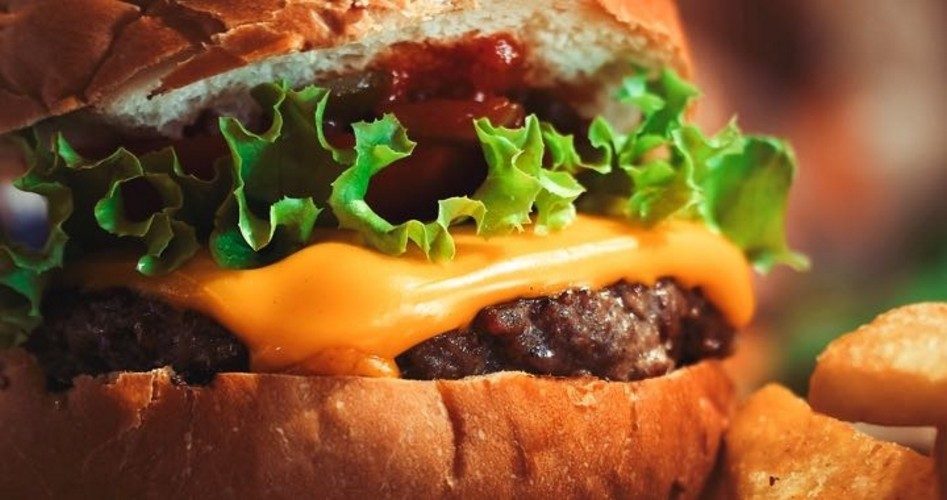
Podcast: Play in new window | Download ()
Subscribe: Android | RSS | More
Hamburger fans at one British university can thank hysteria over “climate change” for forcing them to go off campus for a tasty beef patty. Starting next month, Goldsmiths, University of London will no longer sell any beef on campus as part of its efforts to become carbon-neutral by 2025.
The 128-year-old institution has quite a task ahead of it. According to the BBC, it currently “emits about 3.7 million [kilograms] of carbon each year.”
In addition to banning beef — whose production causes methane from cow flatulence to be released into the atmosphere, thereby contributing to alleged global warming — the university is imposing a 12-cent surcharge on bottled water and single-use plastic cups. It also “plans to install more solar panels” on campus, “switch to a 100% clean energy supplier as soon as possible,” and “identify other areas where planting could help to absorb carbon dioxide,” reported the Beeb.
“Though I have only just arrived at Goldsmiths, it is immediately obvious that our staff and students care passionately about the future of our environment and that they are determined to help deliver the step change we need to cut our carbon footprint drastically and as quickly as possible,” said Professor Frances Corner, university head.
“Declaring a climate emergency” — the latest scaremongering term from the global-warming crowd — “cannot be empty words,” she added. “I truly believe we face a defining moment in global history and Goldsmiths now stands shoulder to shoulder with other organizations willing to call the alarm and take urgent action to cut carbon use.”
Corner may be right that her students are largely on the “climate emergency” bandwagon. Goldsmiths Students’ Union (SU) president Joe Leam had nothing but kind words for the latest announcement.
“Our house is on fire,” Leam, thoroughly indoctrinated in global-warming propaganda, declared. (Leam’s words echoed those of autistic Swedish teenager Greta Thunberg, whose word apparently is to be accepted over that of the many scientists who dissent from climate-change orthodoxy.) “I believe Frances Corner and the university management are realizing this and making these changes to put their part of the house fire out.”
“The SU will be a part of this process every step of the way to make sure this stays true, seeking to speed the process up wherever possible, and will keep the college community updated throughout,” Leam continued.
Environmentalists, naturally, also praised the university’s moves. “It’s encouraging to see an institution like Goldsmiths not simply declaring a climate emergency but acting on it,” said Rosie Rogers of Greenpeace U.K. “We call on others to urgently follow suit and to include cutting all ties from fossil fuel funding in their climate-emergency response.”
Beef producers, on the other hand, were dismayed by the Porterhouse prohibition.
“Tackling climate change is one of the greatest challenges of our time but singling out one food product is clearly an overly simplistic approach,” said National Farmers’ Union (NFU) vice president Stuart Roberts.
Roberts urged beef banners to reconsider their approach. Pointing out that British beef producers have “a greenhouse gas footprint 2.5 times smaller than the global average,” he said, “The NFU has for years been encouraging public bodies such as schools and universities to back British farming and source their produce locally wherever possible. This makes more sense and keeps the choice to eat tasty, sustainably-produced meat firmly on the menu.”
Know what would make even more sense? Heeding the facts instead of the hysteria surrounding “climate change.” Given the relative paucity of reliable temperature data prior to the 20th century — not to mention the suspicious alterations of the existing historical record — no one really knows for sure if the globe is warming relative to historical trends, if any warming that does exist is the result of human activity, and if the results of any warming would necessarily be positive or negative (or mixed). On the other hand, we do know for certain that, as physicist Dr. Tom Sheahen put it, “methane is irrelevant as a greenhouse gas,” so boycotting beef in the hopes of saving the planet is a futile exercise.
Meanwhile, climate-change skeptics can take comfort in the likelihood that fewer people eating beef will mean cheaper Big Macs for the rest of us.
Photo: Enes Evren / iStock / Getty Images Plus

